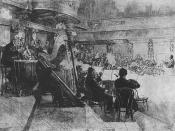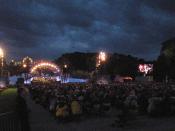For centuries, music has been an outlet for artists. Music is created by artists with the intentions of catching the ears of many. Unfortunately, not all musicians are given a fair chance to have their creations heard by anyone. Women, through all their efforts, have been discriminated in the music world for centuries.
Fans are essential to keep music thriving in our society. They hold a key to who is heard and who is thrown to the side. Fans are major components in the female's role in music. As a musician and woman myself, I know fan appreciation is hard to obtain and hold on to. Playing keyboards in the local pop-punk band, The Brady Experiments, and being the only female, have opened my eyes to the discrimination evident in the music world. I once uncovered this form of little respect after what my fellow band mates and I thought was a terrific performance.
Walking off the stage, I was confronted by a young man who dared to ask me, "Which one is your boyfriend?". I preceded to answer him with, "The other keyboard player," as I saw him huff and answer, "Figures." Confused by the scene that had just taken place I continued to clear the equipment from the stage and go about my business. A few days afterward I understood what the young man had meant by his rude comment. This was the first time I ever felt part of the minority. I am not just in The Brady Experiments because of whom I happen to be dating. I am in the band because of I have the talent my band mates thought would be helpful in improving the music they were playing. It is a shame that any woman would have to feel as low as I did after that day. I play music, something I love to do, but when I try to share this with others my gender keeps me from being completely appreciated.
Fans of music are not the only ones who discriminate against women artists. Fellow musicians, to these ladies, also bring gender controversies. Feminist groups, such as the International Alliance for Women in Music and the National Organization for Women, fought for equal rights in choosing the Vienna Philharmonic Orchestra. The orchestra was discriminating against women musicians only allowing men to join the group. It was not until February 27, 1997 that a woman, Anna Lelkes, was finally granted membership status to the Vienna Philharmonic, which had existed since 1872 (Buzzarté).
The Vienna Philharmonic Orchestra was the last major orchestra to refuse membership to women. After pressure was brought on through the international media by the Austrian government, the music community, feminist groups, and individuals, the group voted to grant membership to women. Still, however, after 125 years of sexism, "changing deeply entrenched attitudes within the orchestra will take time: the integration of women into previously all-male domains is rarely a smooth process, and transitions from tokenism to full equality are usually measured in decades, not in years" (Buzzarté).
Though women musicians seem as though they are being put through enough, critics still take their stab at them. Underground female recording artists often feel the pressures of the "riot grrrl" label from critics. Riot Grrrls are women in rock attempting to have equality between artists and fans in the underground music world. Along with this label, women musicians face critics' comments on how their appearance plays a drastic role in how popular they become also. Kelly Wiemer of the hardcore band Lords of Lightspeed once commented in an interview about the role of criticism in the music world. "It's the way I live my life. It's the things I choose to buy or not buy. How I spend my money; what I eat" (McKennedy). Wiemer, along with other female artists, seeks to see more women interested in her music and the music industry altogether. "There are a lot of girls in metal. But I do think there still needs to be more attention paid to creating a welcoming space to girls and women in hardcore. There are people nowadays that ignore that" (McKennedy).
Fan, fellow artists, and critics are all barriers to women striving for achievement in the music world. Women bias in music is an obvious setback to female musicians. Women need to stand strong with all their efforts of becoming successful in the industry. Over times, gender bias in the music world will become less evident with the effort of today and tomorrow's musicians. For now, women in rock will have to deal their best with the discrimination. One day, maybe all will see just how many women in rock actually do rock.




